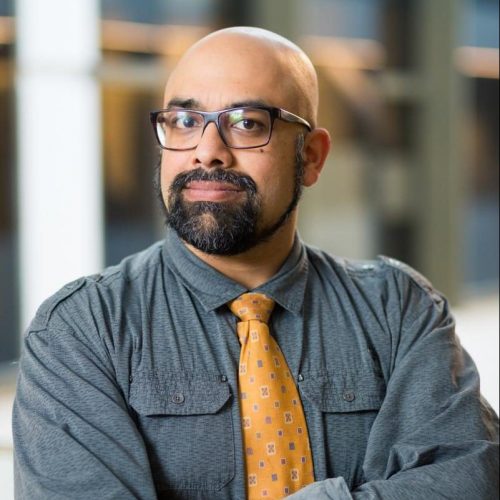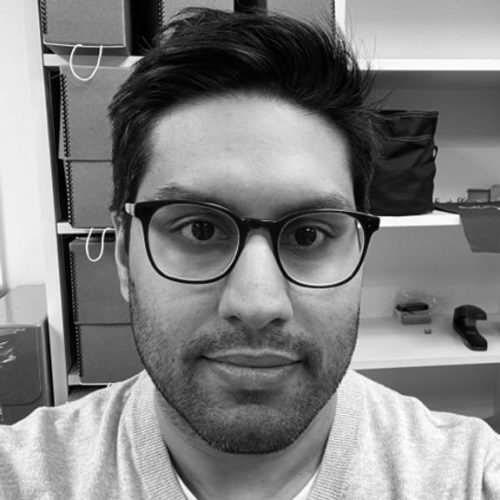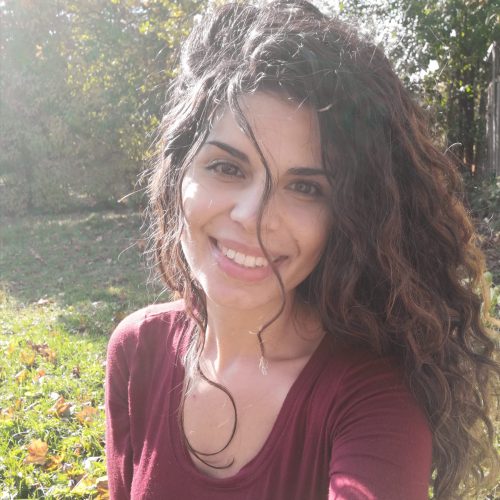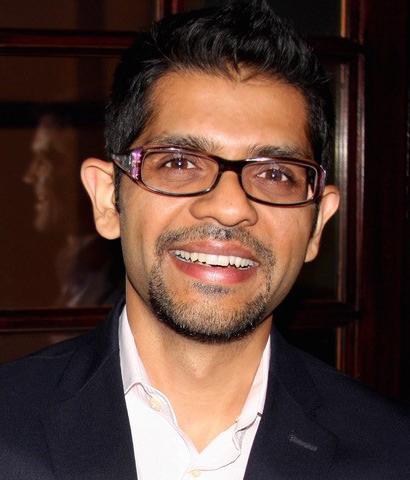People

The IIS is made up of staff, researchers, and scholars who bring their unique expertise and collaborative spirit to projects that help elevate our understanding of Islam and Muslims.
Director


Anver Emon
Director, Institute of Islamic StudiesAnver M. Emon is Professor of Law and History and Canada Research Chair of Islamic Law and History at the University of Toronto. His research integrates a careful attention to Islamic legal history and contemporary debates on law and governance. He is director of the IIS, where he helps research teams incubate large scale research projects that have the capacity to recalibrate both academic and public debates on Islam and Muslims.
Anver M. Emon’s research centers on the study of Islamic law and history. His publications address both premodern histories of Islamic law, and how those histories are deployed in contemporary debates on governance and the rule of law at a time when the spectre of ‘Islam’ and ‘Muslim’ are highly politicized tropes in public debate around the world. A professor in both the Faculty of Law and Department of History, Emon’s teachings range from foundational courses in legal education (constitutional law and statutory interpretation), to historical methods courses that center the study of Islamic law and comparative law. He has received numerous awards and recognition for his scholarship, having been the 2014 Guggenheim Fellow in Law, appointed to the College of the Royal Society of Canada and awarded its 2017 Kitty Newman Memorial Award in Philosophy, and named a Senior Fellow to Massey College.
In addition to publishing numerous articles, Professor Emon is the author of The ‘Islamic’ Deployed: The Study of Islam in Four Registers (Middle East Law and Governance, 2019), Islamic Natural Law Theories (Oxford University Press, 2010), and Religious Pluralism and Islamic Law: Dhimmis and Others in the Empire of Law(Oxford University Press, 2012), as well as the co-editor of Islamic Law and International Human Rights Law: Searching for Common Ground? (Oxford University Press, 2012). His most recent book, Jurisdictional Exceptionalisms (Cambridge University Press, 2021), (co-authored with Urfan Khaliq) interrogates the fields of private international law and Islamic law as they impose themselves on the bodies of children abducted by parents across state borders.
Staff


Samira Benhamida
Business Officer, Institute of Islamic StudiesI’m Samira Benhamida, a financial administrator with over 10 years of experience in budgeting, financial reporting, and supporting research programs. I’ve been with the University of Toronto since August 2023, and before that, I worked with faculty, postdocs, and research teams at École Polytechnique de Montréal and the University of Montreal. I enjoy streamlining processes, preparing reports, and keeping everything running smoothly behind the scenes.

Mitra Fakhrashrafi
Archivist, Muslims in Canada ArchivesMitra Fakhrashrafi (she/her) is a curator and emerging archivist interested in creating places of sanctuary and indebted to border abolition organizing. In 2020, Mitra published a Master’s thesis on shisha ban’s, surveillance and Muslim placemaking in the Greater Toronto Area.

Aly Rattansi
Archivist, Muslims in Canada ArchivesAly is an archivist/chief archivist of the Muslims in Canada Archives at the University of Toronto. Previously he worked in media design, web3 and in museums and libraries. His research interests lie at the intersection of communities development and GLAM, and the study of Islam in the Americas. He holds degrees in information, the study of religion, and material culture from the University of Toronto.

Zainab Yusofi
Communications, Administrative, and Outreach Lead | Events SpecialistZainab Yusofi is the Communications, Administration, Events, and Outreach Lead at the Institute of Islamic Studies. She holds a Master’s degree in Labor Relations and Human Resources from the University of Toronto, along with a background in Global Affairs/Global Studies. With extensive experience across nonprofit, private sector, and school board settings, Zainab brings expertise in strategic communications, project coordination, event planning, IT management, and HR operations. Her global journey and fluency in multiple languages enable her to build meaningful connections and foster inclusive engagement across diverse communities.
Research Fellows


Amanie Antar
Postdoctoral FellowAmanie Antar is a Post Doctoral Fellow at the Institute of Islamic Studies where she researches premodern iterations of anti-Islamic discourse in the medieval and early modern Mediterranean context, with a specialized focus on Iberia. Her research is also committed to recovering the empowering counterresponses to Islamophobic rhetoric in the premodern period and the ways in which modalities of resistance engaged and/or disputed anti-Islamic discourse. She holds a PhD and MA from Queen’s University, and an undergraduate degree from McGill University.

Sara Hamed
Postdoctoral FellowDr. Sara Hamed is a SSHRC Postdoctoral Fellow at the University of Toronto’s Institute of Islamic Studies, where her research lies at the intersection of the anthropology of Islam, Canadian non-profit studies, and rhetorical studies.
An ethnographer of contemporary Muslim civil society, she conducts community-engaged research that is both reflective of and consequential to the lived realities of her interlocutors. She also serves as Project Manager for the “Advancing Culturally Competent Legal Services for Muslim Communities in Ontario” initiative, a project of the Muslim Legal Support Centre (MLSC) funded by the Law Society of Ontario.
A two-time recipient of SSHRC graduate awards, she has additionally held a graduate fellowship at the R. F. Harney Program in Ethnic, Immigration, and Pluralism Studies at the Munk School of Global Affairs and Public Policy, University of Toronto.

Sharifa Patel
Postdoctoral FellowSharifa Patel is a Postdoctoral Fellow at the Institute of Islamic Studies’ Structural Islamophobia Research Lab at the University of Toronto. She holds a PhD in English and Cultural Studies and an MA in Gender Studies and Feminist Research from McMaster University, and an undergraduate degree from the University of Toronto.
Sharifa’s research examines Islamophobia within Canadian policies and how these policies specifically affect Muslim families. Her dissertation research analyzed framings of the Muslim family as a space of patriarchal violence in Canadian news media and political discourses (such as House of Commons debates). In her capacity as the W. P. Bell Postdoctoral Fellow at Mount Allison University, she examined Canada’s intercountry adoption policy which restricts intercountry adoptions from countries that use the Islamic practice of kafala, arguing that the policy is inherently Islamophobic.
Her current postdoctoral project examines the understudied area of Muslim children’s and Muslim families’ relationships with Canada’s child welfare systems and focuses specifically on Muslim children in care in Ontario. Using qualitative methods, this research centers the experiences of Muslim families and Muslim children with Ontario’s child welfare system. This analysis addresses the necessity of tracking and maintaining data on Muslim children in care. As a result, the aim of this research is to also use quantitative methods to develop an archive of disaggregated data to better assess the prevalence of Islamophobia within Ontario’s child welfare system.
Sharifa is also the co-managing editor of the online, open-access journal, Feral Feminisms as well as an external associate for the Robarts Centre for Canadian Studies at York University.
Institute Affiliates


Fahad Ahmad
Advisor, Structural Islamophobia Research LabFahad Ahmad is an Assistant Professor in the Department of Criminology at Toronto Metropolitan University. He is an interdisciplinary scholar interested in national security governance, racialized policing and surveillance, civil society organizations, and the political economy of philanthropy.
Prior to joining Toronto Metropolitan University in July 2022, he was a postdoctoral research fellow at the Centre for Criminology and Sociolegal Studies at the University of Toronto. He obtained his PhD at the School of Public Policy and Administration at Carleton University. His doctoral research, supported by SSHRC and the Pierre Elliott Trudeau Foundation, comparatively examined the securitization of Muslim civil society organizations under national security regimes in Canada and the U.K. He is currently preparing a book manuscript based on his dissertation.
Fahad is an interdisciplinary scholar interested in critical terrorism/radicalization studies; racialized practices of national security policing and surveillance; civil society and resistance; and justice and community-oriented approaches to the study of philanthropy. His scholarship is informed by 15 years of work experience in community and nonprofit organizations in Canada and the U.S. His ongoing projects include work on the SSHRC Connection Grant, “Critical Reflections on Security, 9/11 and the Canadian Settler Colony,” and the SSHRC Partnership Development Grant, “Justice Philanthropy: An international Research-to-Practice Network.” He is also the co-lead for the critical national security hub housed at the Institute of Islamic Studies at the University of Toronto.

Schirin Amir-Moazami
Professor of Islam in Europe, Affiliated Guest Fellow, Institute of Islamic StudiesSchirin Amir-Moazami is Professor of Islam in Europe at the Institute of Islamic Studies at Freie Universität Berlin. She studied Political Science and Sociology in Frankfurt/Main, Berlin, Aix-Marseille, and Paris, and holds a PhD in Social and Political Sciences from the European University Institute in Florence. Her research interests include critical secular studies, political theory, postcolonial theory, and the politics of knowledge production.
She has published widely on topics related to Muslims and Islam in Europe, particularly in Germany and France, with a focus on political secularism, knowledge production, body politics, and governmentality. Her latest monograph, Interrogating Muslims: The Liberal-Secular Matrix of Integration, was published by Bloomsbury Academic in 2022.
In her current research, she explores the relationship between “reason of state” (Staatsräson) and the securitization of knowledge production in contemporary Germany. Another ongoing project examines the political rationalities underlying state-organized Islamism prevention.

Abdie Kazemipur
Data Team, Muslims in Canada Data InitiativeDr. Abdie Kazemipur is Professor of Sociology and the Chair of Ethnic Studies at the University of Calgary.
He previously served as Stephen Jarislowsly Chair in Culture Change and Immigration at Memorial University of Newfoundland, and has been the founding director of two research data centres at the University of Lethbridge and Memorial University. His research is in two distinct areas: the socio-economic experiences of immigrants in Canada, and the socio-cultural developments in the Middle East, on which he has published eight books. His book, The Muslim Question in Canada: A Story of Segmented Integration (UBC Press, 2014), received the 2015 John Porter Excellence Award from Canadian Sociological Association. He is currently working on a new book, titled Sacred as Secular: Secularization under Theocracy in Iran. Commentaries and interviews about his works have appeared in The Globe and Mail, The Toronto Star, la Presse, Winnipeg Free Press, Vancouver Sun, Lethbridge Herald, Global TV, TVO, and Russia Today TV, among others.